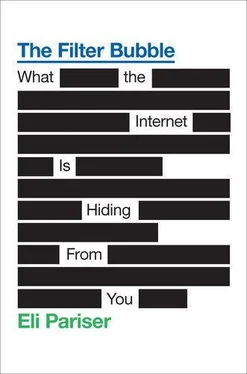The dynamics of lock-in are described by Metcalfe’s law, a principle coined by Bob Metcalfe, the inventor of the Ethernet protocol that wires together computers. The law says that the usefulness of a network increases at an accelerating rate as you add each new person to it. It’s not much use to be the only person you know with a fax machine, but if everyone you work with uses one, it’s a huge disadvantage not to be in the loop. Lock-in is the dark side of Metcalfe’s law: Facebook is useful in large part because everyone’s on it. It’d take a lot of mismanagement to overcome that basic fact.
The more locked in users are, the easier it is to convince them to log in—and when you’re constantly logged in, these companies can keep tracking data on you even when you’re not visiting their Web sites. If you’re logged into Gmail and you visit a Web site that uses Google’s Doubleclick ad service, that fact can be attached to your Google account. And with tracking cookies these services place on your computer, Facebook or Google can provide ads based on your personal information on third-party sites. The whole Web can become a platform for Google or Facebook.
But Google and Facebook are hardly the only options. The daily turf warfare between Google and Facebook occupies scores of business reporters and gigabytes of blog chatter, but there’s a stealthy third front opening up in this war. And though most of the companies involved operate under the radar, they may ultimately represent the future of personalization.
The manhunt for accomplices of the 9/11 killers was one of the most extensive in history. In the immediate aftermath of the attacks, the scope of the plot was unclear. Were there more hijackers who hadn’t yet been found? How extensive was the network that had pulled off the attacks? For three days, the CIA, FBI, and a host of other acronymed agencies worked around the clock to identify who else was involved. The country’s planes were grounded, its airports closed.
When help arrived, it came from an unlikely place. On September 14, the bureau had released the names of the hijackers, and it was now asking—pleading—for anyone with information about the perpetrators to come forward. Later that day, the FBI received a call from Mack McLarty, a former White House official who sat on the board of a little-known but hugely profitable company called Acxiom.
As soon as the hijackers’ names had been publicly released, Acxiom had searched its massive data banks, which take up five acres in tiny Conway, Arkansas. And it had found some very interesting data on the perpetrators of the attacks. In fact, it turned out, Acxiom knew more about eleven of the nineteen hijackers than the entire U.S. government did—including their past and current addresses and the names of their housemates.
We may never know what was in the files Acxiom gave the government (though one of the executives told a reporter that Acxiom’s information had led to deportations and indictments). But here’s what Acxiom knows about 96 percent of American households and half a billion people worldwide: the names of their family members, their current and past addresses, how often they pay their credit card bills whether they own a dog or a cat (and what breed it is), whether they are righthanded or left-handed, what kinds of medication they use (based on pharmacy records)… the list of data points is about 1,500 items long.
Acxiom keeps a low profile—it may not be an accident that its name is nearly unpronounceable. But it serves most of the largest companies in America—nine of the ten major credit card companies and consumer brands from Microsoft to Blockbuster. “Think of [Acxiom] as an automated factory,” one engineer told a reporter, “where the product we make is data.”
To get a sense of Acxiom’s vision for the future, consider a travel search site like Travelocity or Kayak. Ever wondered how they make money? Kayak makes money in two ways. One is pretty simple, a holdover from the era of travel agents: When you buy a flight using a link from Kayak, airlines pay the site a small fee for the referral.
The other is much less obvious. When you search for the flight, Kayak places a cookie on your computer—a small file that’s basically like putting a sticky note on your forehead saying “Tell me about cheap bicoastal fares.” Kayak can then sell that piece of data to a company like Acxiom or its rival BlueKai, which auctions it off to the company with the highest bid—in this case, probably a major airline like United. Once it knows what kind of trip you’re interested in, United can show you ads for relevant flights—not just on Kayak’s site, but on literally almost any Web site you visit across the Internet. This whole process—from the collection of your data to the sale to United—takes under a second.
The champions of this practice call it “behavioral retargeting.” Retailers noticed that 98 percent of visitors to online shopping sites leave without buying anything. Retargeting means businesses no longer have to take “no” for an answer.
Say you check out a pair of running sneakers online but leave the site without springing for them. If the shoe site you were looking at uses retargeting, their ads—maybe displaying a picture of the exact sneaker you were just considering—will follow you around the Internet, showing up next to the scores from last night’s game or posts on your favorite blog. And if you finally break down and buy the sneakers? Well, the shoe site can sell that piece of information to BlueKai to auction it off to, say, an athletic apparel site. Pretty soon you’ll be seeing ads all over the Internet for sweat-wicking socks.
This kind of persistent, personalized advertising isn’t just confined to your computer. Sites like Loopt and Foursquare, which broadcast a user’s location from her mobile phone, provide advertisers with opportunities to reach consumers with targeted ads even when they’re out and about. Loopt is working on an ad system whereby stores can offer special discounts and promotions to repeat customers on their phones—right as they walk through the door. And if you sit down on a Southwest Airlines flight, the ads on your seat-back TV screen may be different from your neighbors’. Southwest, after all, knows your name and who you are. And by cross-indexing that personal information with a database like Acxiom’s, it can know a whole lot more about you. Why not show you your own ads—or, for that matter, a targeted show that makes you more likely to watch them?
TargusInfo, another of the new firms that processes this sort of information, brags that it “delivers more than 62 billion real-time attributes a year.” That’s 62 billion points of data about who customers are, what they’re doing, and what they want. Another ominously named enterprise, the Rubicon Project, claims that its database includes more than half a billion Internet users.
For now, retargeting is being used by advertisers, but there’s no reason to expect that publishers and content providers won’t get in on it. After all, if the Los Angeles Times knows that you’re a fan of Perez Hilton, it can front-page its interview with him in your edition, which means you’ll be more likely to stay on the site and click around.
What all of this means is that your behavior is now a commodity, a tiny piece of a market that provides a platform for the personalization of the whole Internet. We’re used to thinking of the Web as a series of one-to-one relationships: You manage your relationship with Yahoo separately from your relationship with your favorite blog. But behind the scenes, the Web is becoming increasingly integrated. Businesses are realizing that it’s profitable to share data. Thanks to Acxiom and the data market, sites can put the most relevant products up front and whisper to each other behind your back.
Читать дальше











